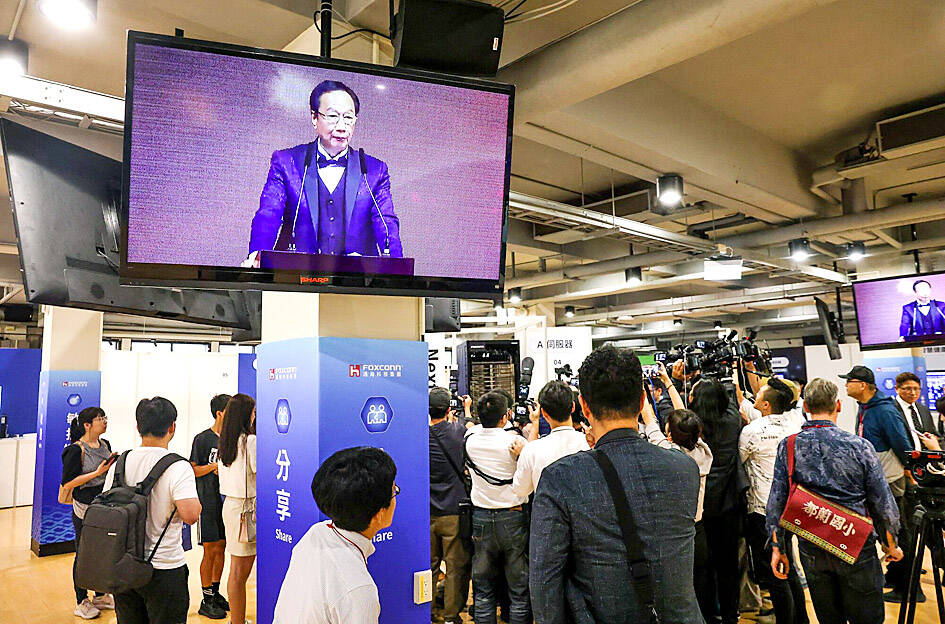Terry Gou (郭台銘), the billionaire founder of iPhone assembler Hon Hai Precision Industry Co (鴻海精密), has finally reached a goal that had eluded him for about eight years.
Shares of Hon Hai, known as Foxconn Technology Group (富士康科技集團) internationally, on Monday closed at NT$200, a level Gou had pledged to achieve in 2016.
The Taipei-listed stock retreated 0.75 percent to close at NT$198.5 on a mild technical pullback yesterday, but it has surged 91.39 percent this year on investor enthusiasm for artificial intelligence (AI) servers and the potential of the latest Apple Inc products.

Photo: Bloomberg
While Gou stepped down as Hon Hai chairman in 2019 to unsuccessfully pursue Taiwan’s presidency, the price represents a landmark for the firm he started 50 years ago.
Annual general meetings in past years had featured shareholders asking Gou when his famous target would be attained. This year’s meeting demonstrated how the company has evolved in new fields including AI servers, which it expects to become its next NT$1 trillion (US$30.87 billion) business, and electric vehicles.
The robust performance this year of Hon Hai and Taiwanese tech peers also underscores the transformation of the country’s contract manufacturers from low-margin, commodity information technology products to higher value-added offerings.
“The AI wave lifts all boats,” said Xiadong Bao, a fund manager at Edmond de Rothschild Asset Management.
For Hon Hai, “the rally is mainly driven by the AI server ramp-up, further expansion into AI-related networking equipment and high expectations for a general server and PC recovery,” he said.
Hon Hai reported that its revenue last month grew 22 percent year-on-year to a record high for the May, and said it is likely to beat expectations for the second quarter, due to stronger-than-expected demand for AI servers.
Hon Hai’s dip in shares yesterday, pared a rally that has shown some signs of overheating. Hon Hai is trading at a record high valuation of 16 times estimated forward earnings compared with its five-year average of 10 times.
However, Bloomberg Intelligence analyst Steven Tseng (曾緒良) sees potential for the stock to keep climbing above NT$200.
There was a “turning point” in March for Hon Hai, with the market realizing its relationship with Nvidia Corp and importance in the AI supply chain, Tseng said.

With an approval rating of just two percent, Peruvian President Dina Boluarte might be the world’s most unpopular leader, according to pollsters. Protests greeted her rise to power 29 months ago, and have marked her entire term — joined by assorted scandals, investigations, controversies and a surge in gang violence. The 63-year-old is the target of a dozen probes, including for her alleged failure to declare gifts of luxury jewels and watches, a scandal inevitably dubbed “Rolexgate.” She is also under the microscope for a two-week undeclared absence for nose surgery — which she insists was medical, not cosmetic — and is

GROWING CONCERN: Some senior Trump administration officials opposed the UAE expansion over fears that another TSMC project could jeopardize its US investment Taiwan Semiconductor Manufacturing Co (TSMC, 台積電) is evaluating building an advanced production facility in the United Arab Emirates (UAE) and has discussed the possibility with officials in US President Donald Trump’s administration, people familiar with the matter said, in a potentially major bet on the Middle East that would only come to fruition with Washington’s approval. The company has had multiple meetings in the past few months with US Special Envoy to the Middle East Steve Witkoff and officials from MGX, an influential investment vehicle overseen by the UAE president’s brother, the people said. The conversations are a continuation of talks that

CAUTIOUS RECOVERY: While the manufacturing sector returned to growth amid the US-China trade truce, firms remain wary as uncertainty clouds the outlook, the CIER said The local manufacturing sector returned to expansion last month, as the official purchasing managers’ index (PMI) rose 2.1 points to 51.0, driven by a temporary easing in US-China trade tensions, the Chung-Hua Institution for Economic Research (CIER, 中華經濟研究院) said yesterday. The PMI gauges the health of the manufacturing industry, with readings above 50 indicating expansion and those below 50 signaling contraction. “Firms are not as pessimistic as they were in April, but they remain far from optimistic,” CIER president Lien Hsien-ming (連賢明) said at a news conference. The full impact of US tariff decisions is unlikely to become clear until later this month

Nintendo Co hopes to match the runaway success of the Switch when its leveled-up new console hits shelves on Thursday, with strong early sales expected despite the gadget’s high price. Featuring a bigger screen and more processing power, the Switch 2 is an upgrade to its predecessor, which has sold 152 million units since launching in 2017 — making it the third-best-selling video game console of all time. However, despite buzz among fans and robust demand for pre-orders, headwinds for Nintendo include uncertainty over US trade tariffs and whether enough people are willing to shell out. The Switch 2 “is priced relatively high”